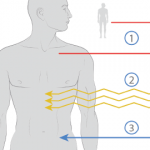WASHINGTON, D.C.—Rheumatologists often have questions about if and when to refer their patients with systemic autoimmune rheumatic disease-related interstitial lung disease (SARD-ILD) for lung transplantation. At a session of ACR Convergence 2024, Sonye Danoff, MD, PhD, assistant professor in the Division of Pulmonary and Critical Care Medicine and co-director of the Hopkins Interstitial Lung Disease Clinic, Johns Hopkins Medicine, Baltimore, explored these and related issues.
Realistic Expectations for Lung Transplant
For patients with poor response to therapy and radically reduced expected life span from severe SARD-ILD, lung transplantation represents an important treatment option. But lung transplants are incredibly rigorous procedures with many potential short-term and long-term complications, with poorer median long-term survival compared with other types of transplants. Many patients with SARD-ILD who are considering transplant have additional disease factors that only add to these risks.
Dr. Danoff underscored the intensity and complexity of the surgery, which often takes 8–12 hours of operating time to complete.1 “It’s really important to have a realistic understanding of the likelihood of benefit for our patients, because clearly our goal is to provide the best for them,” she said.
By learning more about the procedure, rheumatologists may be in a better position to field questions from patients about when and if they might explore transplantation as an option.
SARD-ILD patients who are lung transplant candidates also need their underlying SARD under good medical control prior to transplant.
Contraindications
Dr. Danoff discussed some of the absolute contraindications for the procedure. These include recent history of malignancy, significant dysfunction of another organ system refractory to therapy (e.g., the heart or liver), severe atherosclerotic disease, uncontrolled bleeding disorder, chronic infection with highly virulent pathogens, chest wall deformity, medical instability (e.g., patients on ventilators), active substance abuse, poor compliance or body mass index (BMI) of 35 kg/m2 or higher, although the latter may be more flexible. Dr. Danoff noted that a BMI under 16 kg/m2 is also contraindicated, which can sometimes pertain to patients who have lost weight due to SARD-ILD medications.2
Relative contraindications can include such features as class I obesity (BMI ≥30 kg/m2 and ≤35kg/m2), severe malnutrition, severe osteoporosis and prior extensive lung surgery. Age over 65 is also a relative contraindication, although Dr. Danoff noted the field is moving more toward a model of physiologic age and overall fitness instead of chronological age.2



